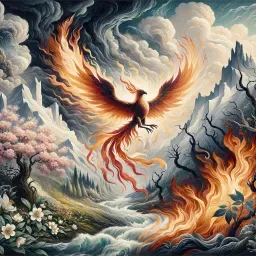It never rains but it pours

0
0
0
0
- Meaning
- The meaning of "It never rains but it pours" is that once one bad thing happens, a series of other big problems often follow in quick succession. This phrase essentially reflects the human experience that adversities often cluster together, rather than happening sporadically. Philosophically, it taps into the concept of the Law of Attraction or the idea that "when it rains, it pours," emphasizing how circumstances, whether good or bad, seem to amplify once they start to occur.
- Allegory
- The elements in the image are allegorical representations of the proverb. The torrential downpour symbolizes the cascade of problems. The small mishaps (an umbrella flying away, a shoe stuck in the mud, a bag ripping open) illustrate minor troubles that add up, reflecting the essence of the proverb. The determined look of the person facing the rain indicates human resilience against adversities. The person without an umbrella striding easily through the rain signifies the contrast in handling adversities, emphasizing resilience and preparedness. The dark rain clouds transitioning to bright sunlight symbolize hope and resolution, reinforcing that challenges are temporary and can be overcome, promoting a positive outlook amidst difficulties.
- Applicability
- This proverb can be applied to personal life in several ways. For instance, if someone encounters a stressful situation at work, they might notice personal challenges at home surfacing at the same time. Recognizing this pattern can help individuals prepare mentally and emotionally for handling compounded difficulties, and reinforce the idea of striving for resilience and preparedness. By anticipating that challenges might come in waves, one can strategize better coping mechanisms.
- Impact
- The impact of this phrase on culture and society is significant as it advanced beyond a simple meteorological observation to encapsulate a broader human truth about the nature of adversity and fortune. It is commonly cited in literature and daily conversation to describe situations where troubles or events seem to cluster together. The phrase has been referenced in media, including books, TV shows, and films, demonstrating its widespread recognition and applicability.
- Historical Context
- The earliest uses of this phrase date back to the early modern period of England. The phrase started appearing in literature in the 18th century. It was initially used to describe the somewhat exaggerated experience of weather patterns, which has since evolved metaphorically.
- Criticisms
- Potential criticisms of the phrase could focus on its fatalistic undertone, suggesting an inevitability about misfortune that could be overly pessimistic. Skeptics might argue that such thinking can foster a negative outlook, where people expect bad things to happen just because one issue arises, potentially attracting more negativity.
- Variations
- Variations of this phrase exist in different cultures. For instance, in Spanish, there's a saying "llueve sobre mojado" (it rains on wet ground), indicating that misfortunes often happen to those already experiencing them. In Japanese, there's a saying, "泣き面に蜂" (A bee stings on a crying face), meaning misfortune strikes twice at the same spot, further emphasizing the universality of this experience.
-

The end justifies the means.
-

Parting is all we know of heaven, and all we need of hell.
-

Don't cry over spilled milk.
-

We must accept finite disappointment, but never lose infinite hope.
-

The road to hell is paved with good intentions.
-

Practice makes perfect.
-

Desperate times call for desperate measures.
-

The world is always burning.
-

Tears are the silent language of grief.
-

A lie can travel halfway around the world while the truth is still putting on its shoes.
No Comments